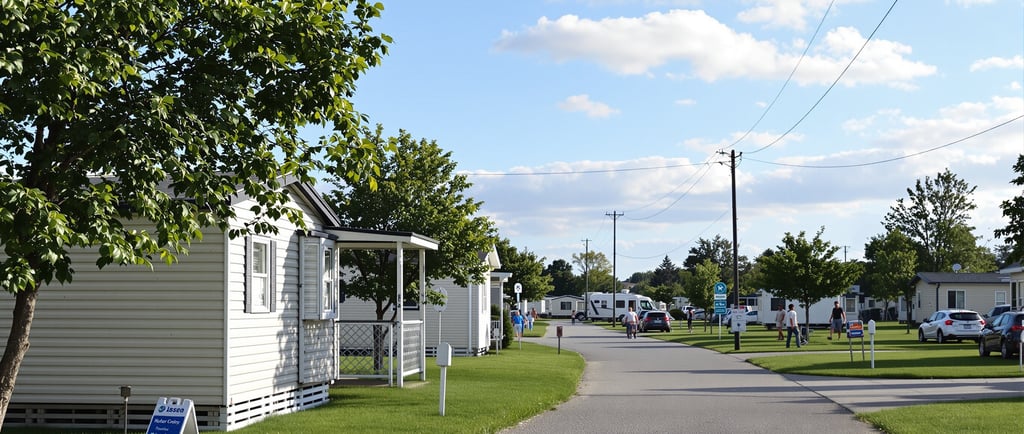Exploring the Benefits of Living in a Mobile Home Community
9/27/20257 min read


Introduction to Mobile Home Communities
Mobile home communities, also known as manufactured home communities, are residential areas where individuals or families live in portable homes that are constructed off-site and transported to their locations. These homes are usually built in compliance with specific federal construction standards, ensuring safety and durability. What distinguishes mobile home communities from traditional housing developments is their unique structure and layout. Mobile homes are typically placed on leased lots within a community, which may boast shared amenities such as clubhouses, recreational facilities, and landscaped common areas.
The growing popularity of mobile home communities can be attributed to several factors, including affordability and flexibility. As housing costs continue to rise, many people, particularly retirees, young families, and individuals seeking lower living expenses, find mobile home communities an appealing solution. These communities often provide an economical alternative to conventional housing, allowing residents to enjoy homeownership without the burden of excessive mortgages.
Demographically, mobile home communities attract a diverse range of residents. Retirees, for instance, often seek the convenience of these communities, which frequently offer opportunities for social engagement and leisure activities. Young families, on the other hand, are drawn to the affordability and sense of community that these neighborhoods provide, as they can access quality education and amenities without the financial strain associated with traditional homes. Additionally, single individuals and working professionals appreciate the flexibility that comes with mobile home living, allowing for mobility without sacrificing their living standards.
Overall, mobile home communities represent an increasingly popular housing trend that caters to a broad demographic spectrum, offering distinct advantages that appeal to many looking for a balanced lifestyle.
Affordability and Cost Savings
Mobile home communities are increasingly recognized for their affordability, providing an attractive alternative to traditional housing options. One of the most compelling aspects of residing in a mobile home community is the significantly lower costs associated with purchasing a mobile home. Generally, the initial investment for a mobile home is far lower than that of a site-built house, making it a feasible option for individuals and families on tighter budgets. This accessibility opens the door to homeownership for a broader range of people who may find traditional real estate prices prohibitive.
In addition to the initial purchase price, the costs related to maintaining a mobile home are often less burdensome. Homeowners face lower utility bills due to the smaller size of mobile homes, which typically enhances energy efficiency. Moreover, mobile homeowners frequently benefit from reduced maintenance costs, as these homes are designed for economic use of materials and are generally simpler to repair or upgrade than more conventional homes. This can have a substantial impact on the long-term financial sustainability of homeowners.
Another financial advantage of living in a mobile home community is the potential for lower property taxes. Because mobile homes are often assessed at a lower value compared to site-built houses, residents can enjoy substantial annual savings. This situation is particularly beneficial for retirees or those on fixed incomes, as reduced property taxes can help mitigate the overall financial pressures of maintaining a household.
Overall, the financial advantages of mobile home living, including reduced purchase costs, lower maintenance expenses, and diminished property taxes, contribute to alleviating financial burdens. This makes mobile home communities an attractive option for various segments of the population seeking more affordable housing solutions.
Sense of Community and Social Interaction
Mobile home communities are often recognized for their strong sense of belonging and camaraderie among residents. This environment nurtures neighborly relationships, offering residents the opportunity to form lasting connections. In these communities, individuals frequently share similar life experiences and interests, thereby laying the groundwork for meaningful interactions. The mutual understanding among residents often leads to a supportive atmosphere where friendships thrive.
One of the main contributors to the close-knit fabric of mobile home communities is the variety of organized activities and events that take place throughout the year. These gatherings, which might include holiday celebrations, potlucks, or game nights, encourage participation and create opportunities for residents to interact with one another. Such events not only promote lively social engagement but also foster a sense of unity, helping residents feel valued and connected to their community.
Additionally, communal spaces within mobile home communities—such as clubhouses, parks, or recreation areas—serve as pivotal environments for interaction. These facilities are often designed to facilitate social activities, allowing residents to gather, converse, and engage in shared hobbies. Establishing connections in these common areas amplifies feelings of togetherness, transforming a collection of individual homes into a vibrant network of support and friendship.
Moreover, the emphasis on shared interests among residents can lead to the formation of clubs or groups tailored to specific hobbies—ranging from gardening to crafting or fitness. Such initiatives not only enhance personal well-being but also strengthen community ties through collaborative participation.
Overall, the communal spirit and social interaction inherent in mobile home communities significantly enrich the living experience, making it more fulfilling and supportive. These environments facilitate not only dynamic friendships but also an overall sense of belonging that residents often cherish deeply.
Flexibility and Lifestyle Freedom
Living in a mobile home community presents a unique opportunity for flexibility and lifestyle freedom that traditional housing often cannot offer. One of the primary advantages is the ease with which residents can relocate. Mobile homes are designed for mobility, allowing individuals and families to move more straightforwardly and with fewer financial commitments than conventional homeowners. This flexibility is particularly appealing to retirees seeking to travel or snowbirds who wish to spend part of the year in different climates. Being part of a mobile home community affords the possibility of exploring various locations without the burdens associated with selling a property.
Another significant aspect of mobile home living is the customization options available. Residents can often modify their homes to reflect personal tastes and needs, which can be an essential factor for individuals who prioritize unique styles or functionalities. From the layout to interior decor, homeowners in mobile communities can create spaces that suit their lives, whether it's a minimalist environment that embraces simplicity or a vibrant home filled with personal touches. This level of customization can lead to enhanced satisfaction and well-being, making the mobile home an ideal choice for those who relish a personalized living experience.
Furthermore, mobile home communities cater to diverse lifestyles, making them appealing to a variety of residents. Whether someone is pursuing a minimalistic lifestyle that prioritizes freedom from excessive belongings or a traveler seeking an easy base camp, mobile home living can accommodate these priorities. Many communities cultivate social atmospheres where residents can share similar values, encouraging a sense of belonging. Thus, the overarching flexibility of mobile home living allows individuals to tailor their environment and living arrangements, ensuring that their homes align with their evolving desires and needs over time.
Amenities and Community Features
Mobile home communities often stand out for their extensive amenities and communal features, which significantly enhance the living experience of their residents. These communities frequently provide recreational facilities that support an active lifestyle, encouraging social interactions among neighbors. Options such as walking trails, fitness centers, and sports courts create an energetic atmosphere where residents can engage in various physical activities, fostering a sense of well-being.
In addition to recreational spaces, many mobile home communities include clubhouses that serve as social hubs. These clubhouses often host a variety of activities ranging from game nights to fitness classes, creating an environment where like-minded individuals can connect and build friendships. Such communal spaces not only promote social interaction but also develop a sense of belonging, which is vital for community cohesion.
Swimming pools are another common feature that enhances the allure of mobile home communities. A community swimming pool provides residents with a perfect spot for relaxation and exercise. Family-friendly pool areas often become gathering points, particularly during warmer months, allowing for both leisure and fostering connections among residents.
Gardening areas within these communities offer a unique opportunity for residents to cultivate their interests in horticulture. Many individuals find joy and satisfaction in growing their plants and vegetables, promoting a sustainable lifestyle. Community gardens also create spaces for residents to collaborate, share gardening tips, and enjoy the fruits of their labor together.
The presence of such amenities in mobile home communities not only elevates the quality of life for residents but also attracts individuals seeking vibrant, engaging environments. With abundant opportunities for recreation, socialization, and personal growth, these communities offer much more than just housing solutions. They present a lifestyle that supports health, wellness, and community spirit.
Safety and Security Benefits
Living in a mobile home community often provides significant advantages when it comes to safety and security. One of the primary features that enhance residents' safety is the presence of gated access. Many mobile home communities are equipped with controlled entry points, which not only limit access to authorized residents but also deter potential criminal activity. This barrier serves as a significant security enhancement, allowing residents to enjoy their homes with an added sense of protection.
Moreover, mobile home communities frequently implement community watch programs, which further promote safety among residents. These programs are typically facilitated by a group of volunteers who monitor the neighborhood on a regular basis. This vigilant presence fosters an environment of safety, as residents become actively involved in monitoring suspicious activities and reporting them to local authorities. Such initiatives create a collaborative atmosphere, where individuals feel empowered to take action for their own security and that of their neighbors.
The close-knit environment found in many mobile home communities also contributes greatly to the overall sense of safety. Residents often know one another personally, fostering a spirit of camaraderie that enhances neighborhood vigilance. This familiarity encourages residents to look out for each other, creating a network of support that can act swiftly in response to any potential security threats. This interconnectedness leads to a heightened awareness of unusual or suspicious behavior, further promoting a secure living environment.
These combined elements—gated access, community watch programs, and a supportive neighborhood atmosphere—cultivate a profound sense of security in mobile home communities. As a result, residents often feel safer and more protected in their homes, ultimately fostering peace of mind and enhancing overall quality of life within the community.
Conclusion: Is a Mobile Home Community Right for You?
As we explore the multifaceted benefits of living in a mobile home community, it becomes clear that such an arrangement can offer a unique lifestyle tailored to diverse housing needs. One of the most significant advantages is affordability; mobile home communities often present a more economical option than traditional housing, making homeownership accessible for various individuals and families. Moreover, these communities typically provide a strong sense of camaraderie, fostering social interaction among residents that can contribute to a fulfilling lifestyle.
The maintenance aspects of mobile home living should not be overlooked either. Many communities handle landscaping and other upkeep concerns, allowing residents to enjoy their home without the burdens usually associated with property maintenance. Furthermore, the amenities commonly found in these communities—such as swimming pools, fitness centers, and recreational areas—enhance the overall living experience and promote a healthy work-life balance.
However, determining if a mobile home community aligns with your specific needs requires thoughtful consideration. Evaluate your lifestyle, personal circumstances, and financial situation before deciding. Factors such as local regulations, community governance, and the potential for property appreciation should weigh heavily in your decision-making process. It's essential to reflect on how the lifestyle in a mobile home community aligns with your desires for community interaction and individual space.
If you are drawn to the idea of residing in a mobile home community, numerous resources are available to assist you in your search. Websites focusing on mobile home listings, local real estate agents familiar with such properties, and community forums can provide valuable insights. Take the time to explore these options, ensuring that your choice of residence truly reflects your needs and preferences.
